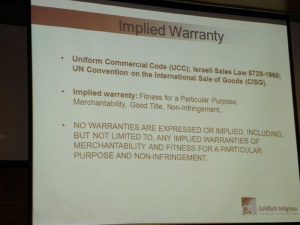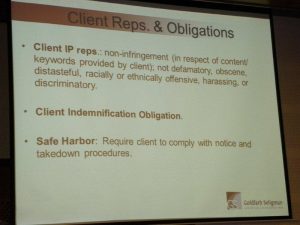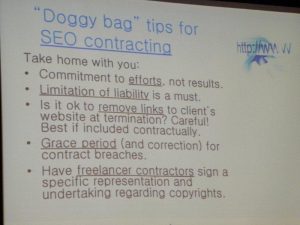Legal Issues in Search – SMX Israel Summary
David Mirchin – Meitar Attorney
Is it OK to buy a trademark of a competitor?
LiveU got a competitor called TVU (tvunetworks.com); the competitor publishes on “LiveU” keyword, is this legitimate?
USA – Geico vs Google, Geico sued Google and lost, Google wasn’t liable for trademark infringement.
Wentworth case, 2007, Settlement funding is the competitor who bought “Wentworth” keyword. To win a TM Infringement claim in the US you should violate trademark by using it in the text of the ad itself but no problem using it in the search query.
Rosetta Stone sued Google and lost too.
Europe was a mess until 18 years ago with many lawsuits. Google France vs. Louis Vuitton – competitors bought the TM from Google and the court said Google and the competitor aren’t liable.
Google is NOT liable for trademark infringement. Competitors are liable only if they use the “Louis Vuitton” text in the ad
Interflora vs Marks & Spencer case – we still wait for the decision outcome.
Summary of the US and EU standard:
Use the scratch your head test – if you need to scratch your head, you’re probably liable…
David Mirchin Legal Presentation
Sharon Aloni from Goldfarb:
Pitfalls:
– No Appreciable rise in ranking
– Drop of revenues
– Additional costs that were not advised
– Use of unethical methods
– Failure that cause server interruptions
– Use of infringing content
– Failure to provide advice on issues within scope
Clear SOW (Statement of Work) – Specifications
– KW analysis
– Content optimization
– Site design
– Link acquisition
– Progress reports and monitoring
– State the things you don’t need to provide in the contract
Carve outs – indicate things you’re allowed to do when the contract is off like removing rented or other links.
LOL
Limitation of liability: carve out consequential damages, cap on liability
Sole remedy: Capped credit/refunds
Insurance
Professional Liability insurance for ISPs, software providers
Coverage E&O, IP infringement
Last tip: don’t see you at court…
Next up is Yoram Lichtenstein about using Trademarks and names in search engines.
DR. Klein vs. proporzia – a person’s name used in adwords is a violation of his privacy right (not trademark).
Crazy Line vs Matim Li – Using competitor’s TradeMark as an adword ad is not a trademark infringement, as long as you do not use the trade mark in the ad or website themselves. Yoram questions the mechanism stating the analogy of the court, says there is no Israeli relevant law and gives an example of a real mall where you can go to a store but see an ad to a different store on your way.
Right of publicity: Ariel McDonald vs. McDonald’s: Right of publicity, financial value to a person’s reputation in a name. Ariel advertised Burger King and then was photo shoot by McDonald’s eating at McDonald’s, Ariel Mcdonald (the person) sued McDonald’s and won.
The “Horrors” of the DR. Klein decision:
Was based on irrelevant right, Could DR. Klein use his privacy right to force Google to remove the problematic content from the results.
See Yoram Lichtenstein presentation
Next is Uri Breitman who talks about “DKI hazards”:
DKI – Dynamic Keyword Insertion puts search query strings into the ad text automatically.
Few samples, you can add DKI to the title or text ad.
Google says: Use DKI with cautious, shows few PPC ads for Bear Parts and Slaves J.
A Supreme Court case – Misradiya on an office depot site, Misradiya is suing, more samples: Groupon and buy2. As said before – it’s legal to buy an ad for a competitor trademark string but not legal to use it in the ad.
Advice: drop the ads, admit the mistake fast, Don’t DKI competitors, Use [Exact match] for DKI, add negative keywords with all of your competitors and use normal ads for that.




